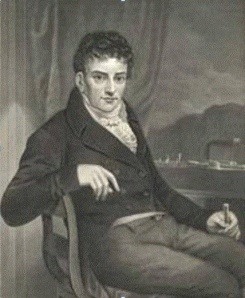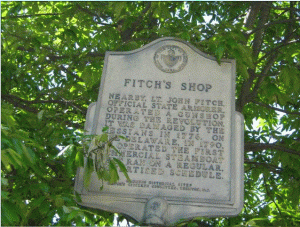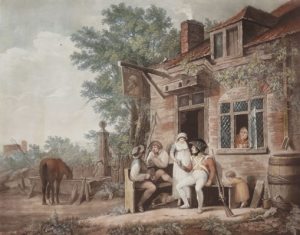 When we last saw my distant ancestor John Fitch he had just buried his gold and silver on Charles Garrison’s farm in the dead of night.
When we last saw my distant ancestor John Fitch he had just buried his gold and silver on Charles Garrison’s farm in the dead of night.
To catch you up, it was December, 1776, and General Washington’s army was staggering through Trenton in full retreat, with Cornwallis fast on their heels.
Fitch and his apprentices were making guns as fast as they could, but with one eye watching for the fierce and now fast-approaching Hessians, German mercenary soldiers of the British army.
Fitch worked until the Hessians were practically on him, then took what he could carry and fled.
No sooner was he gone before his factory was set fire, all his equipment destroyed.
All he had left were some small silversmithing tools and the gold and silver he grabbed quickly and carried, hidden, when he fled.
He buried his precious metals under a chestnut tree by the light of a dim lantern on Garrison’s Pennsylvania farm.
 He carefully smoothed the spot, and mentally marked its precise location for when he returned, knowing it could be months, maybe even a year or more.
He carefully smoothed the spot, and mentally marked its precise location for when he returned, knowing it could be months, maybe even a year or more.
Then Fitch was alone once again.
It was a pattern that repeated itself over and over throughout his life.
He could not make and maintain deep connections with either people or places. Of course, I would run too with the Hessian army chasing me.
But most of the time it was only John Fitch’s dark thoughts that chased him, both from love and ultimate success.
The same dark thoughts that drove him to think of suicide countless times throughout his life.
Yet it’s early. He’s only 33. His greatest achievements – and greatest failures – still lay ahead.
At 33 he has already been one of the most accomplished silversmiths in America, and State armorer to New Jersey, building a factory and employing 60 gunsmiths.
But right now he’s lost.
The treasure that John buried made him a comfortably upper middle class man and gave him some sense of security as he stood in the field wondering which way to turn, what to do next.
He knew that when the war had passed through and he could safely reopen his silver and gun businesses, he had the money to buy the best equipment and set up in the best location.
What to do now was the problem.
While Fitch was escaping Trenton into Pennsylvania, General George Washington was heading the opposite way – crossing the Delaware to defeat the British at Trenton.
The war was young. The shot heard round the world was at Lexington just 14 months earlier, and the British had been chasing General Washington ever since, first all across New Jersey, and now across the Delaware River and into Pennsylvania.
Morale was low, desertions high.
It was December 23, 1776. Thomas Paine was with the troops, and saw the toll their defeats had taken. He sat down and scribbled an impassioned essay.
Washington had it read to his troops: “These are the times that try men’s souls. The summer soldier and the sunshine patriot will, in this crisis, shrink from the service of their country; but he that stands by it now, deserves the love and thanks of man and woman.”
Washington rallied his troops. They mustered, Washington shouted his battle cry, “Victory or die!” and the Continental Army crossed the icy Delaware back into New Jersey and defeated the surprised Hessians. It was a turning point for the war, and now Washington could turn his army toward Morristown New Jersey and their winter headquarters.
This gave James Fitch an idea. He went to Baltimore and proceeded to fill two wagons with tobacco and dry goods, then drove them to the army’s camp at Morristown. After finding he had competition in those products he turned to something the soldiers were not getting enough of: beer.
He set out again, this time buying all the beer one local brewery could brew. When that wasn’t enough, he found other breweries, and was keeping a constant flow of brew to the troops, his wagons going back and forth from brewery to camp as fast as they could.
Fitch made an average of $100 pounds a week, an incredibly good payback. In all, he made $40,000, an enormous fortune.
The only problem was that he was paid in Continental money, not British pounds, and certainly not in gold or silver.
He knew inflation was high, but he didn’t know it was so high that by 1781 the continental would be worth only two and a half percent of its face value. And eventually, Congress would redeem the continental for just one hundredth of its original value.
By the time Fitch closed up shop on his beer deliveries, his $40,000 was worth only $1,000.
Fitch lost his money without the pleasure of buying or gambling it away.
All he had left was the buried treasure on Garrison’s farm, so he set out to go see his old friend, Garrison.
And that’s where it gets really interesting!
Stay tuned….
